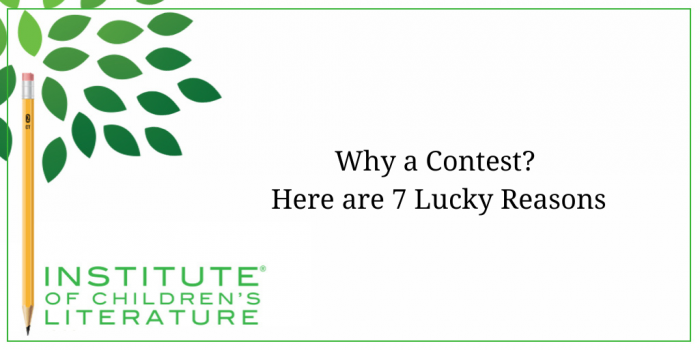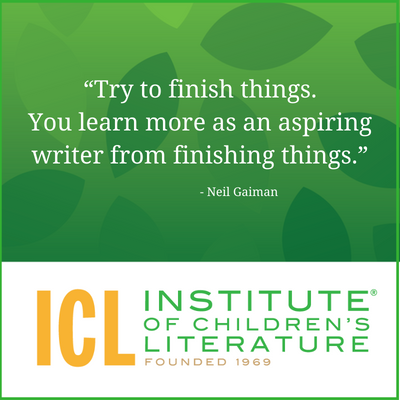1000 N. West Street #1200, Wilmington, DE 19801
© 2024 Direct Learning Systems, Inc. All rights reserved.

There are some writers who just don’t see the value in a writing contest. If you’ve written something, why not just submit it to a publisher? Why a contest? This is a reasonable question. For many of us, the real focus is on writing, submitting, and hopefully getting published. A writing contest doesn’t seem to be part of that straight line of publication. So why would you enter one? Well, here are seven lucky reasons.
No one actually rejects you in a writing contest. You win or you don’t, and simple logic says there can be only one winner. So not winning just means someone else did even better, rather than suggesting that your entry did poorly.

Eventually, if you stay in the business long enough to build a career, you simply come to tolerate rejection (since even pros get rejected) but no one ever likes it. So a contest can be a way to take a break from the rejection experience while still submitting.
Sometimes writers like to stretch and try new things. Or you may have a writing area that you enjoy doing, but you’re not going to make it your regular writing niche.
For example, some prose writers enjoy doing verse now and then. Some novelists enjoy the occasional short story. And some short story writers like trying the challenge of super short forms like flash fiction. As a result, a contest can be a way to dabble in a form that isn’t your usual.
It can therefore be a real help for avoiding burnout (which can come from falling into a writing rut and then pushing yourself while there). It can also be a way to “give yourself permission” to experiment. After all, as said above, there’s no rejection.
Poetry, for example, tends not to pay very well when published. The most common range of pay for a single poem is between 0 and 25 dollars. Many publishers don’t pay for poetry at all because they can fill their poetry needs without ever paying out anything. Those who do pay for poetry, almost always pay substantially less than they do for short stories or articles.
So a poetry contest that may pay anywhere from fifty to several hundred dollars to winners would definitely be a better payday. Even runner-up money is often better than the money you may get from selling to an anthology (which often doesn’t pay at all for poetry) or a magazine.

photo by nataliya vaitkevich
Many writing contests designed to encourage new writers will have some kind of learning experience tied to it. For example, the contests from the Institute end with webinars that help show what things about the winning entries made them winners, thus giving insight into what makes a great story, poem, article, etc.
This kind of “added value” to a contest can definitely be welcome as we continue in an industry that offers less and less feedback on our efforts.
One of the things that frequently brings on writers block is simply the hugeness of the empty page.
What do you write about when you can write about anything? This sometimes grows into block, leaving writers wanting to write but unable to move forward. But many writing contests come with built in restrictive parameters that suddenly make the blank page fears much smaller. You may get a writing prompt (Write a mystery beginning with this line…) or you may be restricted in format (write a short story in ten words…) and those restrictions can actually be a kind of support for your imagination. You no longer must choose between all the options possible, and that can give you the wedge you need to break through your writing block.
Most writing contests get fewer entries than your average slush pile. This is especially true of contests which have an entry fee. Entry fees are not uncommon. They are a way for the sponsor to raise the money for the prizes as well as for paying judges. Now you do need to be careful about where you spend your money on entry fees (a book contest that costs $200 to enter, for example, isn’t giving you an entry fee, it’s taking advantage of you), but entry fees can limit the number of people you’re competing against. And that increases your chances of winning, assuming you’ve written the very best entry you’re capable of.
Writing contests can give you something impressive to put on your writer’s resume and in your writing bio of cover letters and query letters. Even for smaller contests (such as those sponsored by Literary magazines or Arts groups), a contest win signifies that you wrote something that beat out a larger group of entries. Your work was chosen for the prize. And many publishers do like publishing “award-winning authors.”
With over 100 books in publication, Jan Fields writes both chapter books for children and mystery novels for adults. She’s also known for a variety of experiences teaching writing, from one session SCBWI events to lengthier Highlights Foundation workshops to these blog posts for the Institute of Children’s Literature. As a former ICL instructor, Jan enjoys equipping writers for success in whatever way she can.
1000 N. West Street #1200, Wilmington, DE 19801
© 2024 Direct Learning Systems, Inc. All rights reserved.
1000 N. West Street #1200, Wilmington, DE 19801
© 2024 Direct Learning Systems, Inc. All rights reserved.
1000 N. West Street #1200, Wilmington, DE 19801
© 2024 Direct Learning Systems, Inc. All rights reserved.
1 Comment